

P54. UCISA Technology Enhanced Learning. Survey of Technology Enhanced Learning The Academic Support Group has carried out regular surveys on the use of technology enhanced learning in the higher education sector.
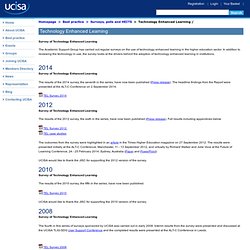
In addition to reviewing the technology in use, the survey looks at the drivers behind the adoption of technology enhanced learning in institutions. Survey of Technology Enhanced Learning The results of the 2014 survey, the seventh in the series, have now been published (Press release). Ofcom: six-year-olds understand digital technology better than adults. They may not know who Steve Jobs was or even how to tie their own shoelaces, but the average six-year-old child understands more about digital technology than a 45-year-old adult, according to an authoritative new report published on Thursday.
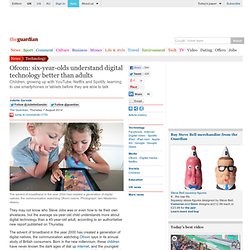
The advent of broadband in the year 2000 has created a generation of digital natives, the communication watchdog Ofcom says in its annual study of British consumers. Born in the new millennium, these children have never known the dark ages of dial up internet, and the youngest are learning how to operate smartphones or tablets before they are able to talk. "These younger people are shaping communications," said Jane Rumble, Ofcom's media research head. "As a result of growing up in the digital age, they are developing fundamentally different communication habits from older generations, even compared to what we call the early adopters, the 16-to-24 age group. " The most remarkable change is in time spent talking by phone.
Educational research publications. ‘The Experience of Learning: Implications for teaching and studying in higher education’ presents the results of research from a series of related studies into the way students learn in higher education.
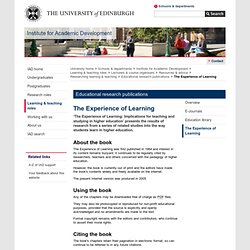
About the book The Experience of Learning was first published in 1984 and interest in its content remains buoyant; it continues to be regularly cited by researchers, teachers and others concerned with the pedagogy of higher education. However, the book is currently out of print and the editors have made the book's contents widely and freely available on the internet. The present Internet version was produced in 2005. Using the book Any of the chapters may be downloaded free of charge as PDF files. They may also be photocopied or reproduced for non-profit educational purposes, provided that the source is explicitly and openly acknowledged and no amendments are made to the text. He-futures-report-new.pdf. Study Proves Why We Need Digital Literacy Education. A few months ago, the Internet buzzed with the results of a study comparing students' note-taking on computers versus note-taking with paper and pen.
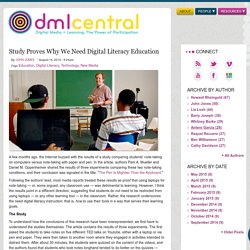
In the article, authors Pam A. Mueller and Daniel M. Oppenheimer shared the results of three experiments comparing these two note-taking conditions, and their conclusion was signaled in the title: "The Pen Is Mightier Than the Keyboard. " Following the authors' lead, most media reports treated these results as proof that using laptops for note-taking — or, some argued, any classroom use — was detrimental to learning. However, I think the results point in a different direction, suggesting that students do not need to be restricted from using laptops — or any other learning tool — in the classroom. Opinion pieces – HEIR Network. Student-voice-in-tertiary-education-settings. The Student Voice: Effective Representation and Quality - Ako Aotearoa.
About the project Click on the image to download the project report (1.3MB .PDF)In 2012, Ako Aotearoa and the New Zealand Union of Students’ Associations commissioned Heathrose Research Ltd. to undertake research into how tertiary organisations can effectively use the voice of students to improve quality of provision.
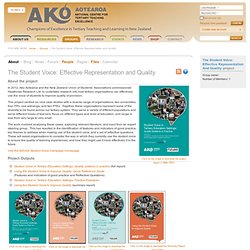
This project centred on nine case studies with a diverse range of organisations: two universities, four ITPs, one wānanga, and two PTEs. Together, these organisations represent some of the diversity to be found across our tertiary system. They serve a variety of different populations and serve different mixes of learners, focus on different types and level of education, and range in size from very large to very small. The work involved analysing these cases, exploring relevant literature, and input from an expert steering group.
Home.